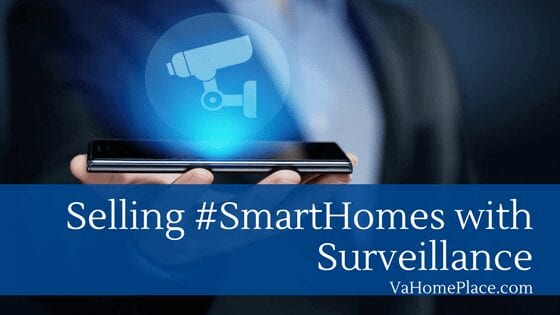Selling #SmartHomes with Cameras
There are a number of facets to consider when a homeowner decides to offer their home for sale. What some homeowners don’t consider are the implications of using their smart cameras while placing the home on the market. However, there exists some liability and risk when checking in on those buyers while they are visiting your home. I’m not an attorney, but I have done my research and have spoken to those in the know. So, here’s a summary of what homeowners should consider. Many of us have invested in Nest’s Dropcams and other smart home cameras to keep our homes safe and to be able to check in on family throughout the day. Commonly these devices allow homeowners to view the inside of the home while away and most of them allow the homeowner to listen in on their house as well. But there are a number of laws that limit the way in which the homeowner can use these features to keep an eye on buyers or other visitors.
Listening or Recording A Home Buyers Visit
We’re going to start with the easier of the audio and video question – the audio.
Can a homeowner listen in on a buyer visiting their home for a showing or inspection?
The short answer is that without some type of consent, probably not. There are federal wiretapping laws that come into play here and almost every state has a specific regulation regarding recording people without consent. Virginia is different from what most people would think. Virginia allows you to record a conversation that you’re involved in without the consent of the other party. (Commonly and cleverly known as the “One Party Consent” rule) You merely need to be a party to the conversation. However, to be a third party that is recording or listening to the conversation of two other individuals is prohibited. At the time of this writing, Virginia makes it a Class 6 Felony to record or listen in to the conversations between other parties that do not include you. You can verify this is section 19.2-62 of Virginia law. (Remember, I’m not an attorney).
Video Streaming Or Recording A Home Buyer’s Visit
The trickier part of the question is the video recording or monitoring part. It’s trickier because technology often outpasses legislation, so the rules aren’t nearly as straightforward. At the time of this writing, there is nothing that expressly prohibits you from using your camera to view the parties that are in your home. The closest rule in Virginia is 18.2-386.1, which makes it illegal to video or photograph someone who is nude or partially nude without their consent. If the buyer is nude or partially nude in your home, you may have bigger issues than this regulation, though.
Can I watch a homebuyer who is in my home via video?
Just remember that most smarthome or internet of things (IOT) cameras allow both audio and recording. No one is going to believe that you aren’t listening in as you’re watching. The broader consideration isn’t if it’s a good practice to watch people on camera, but rather how it could adversely affect you when the buyer realizes that you’ve been peeking in on them while they are visiting your home. A big part of a successful real estate transaction is based on the negotiations and the trust between the buyers and sellers. If the buyers who are visiting your home look up halfway through the home visit and realize that you’ve been creeping in on them you’re going to lose a lot of trust as the buyers will feel victimized and violated. This is hardly the way we want to start our journey with the buyers and may actually cause them to elect to not make an offer on your home.
What We Can Do To Help
If you’ve made it this far into the post you probably are thinking about things that you previously haven’t before and have a question as to how you can keep your surveillance gear in place to protect you and your family’s interest. The good news is that we have answers. Angel and I create informed consent as a way to try and protect your interest. We start with laminated signs outside of the home at each entrance that has a friendly and inviting “disclosure” about the presence of these devices. We also include it in the comments we leave for agents in the multiple listing services so that the agent can inform their buyers that this equipment is in place and that buyers should act accordingly. These are part of several techniques we use to inform the consumer of the existence of these devices and the buyer can make the decision to enter the home knowing that these devices are in place. Of course, these are just some initial steps. There are more things we do to protect your interest and help get the buyer interested and motivated in buying your home. You should give us a call if you’re thinking of selling your home so that we can guide you through other ways to avoid some of the special considerations that arise when selling your gadget-friendly smarthome. If you have any other questions you can always feel free to reach out to us!


 Facebook
Facebook
 X
X
 Pinterest
Pinterest
 Copy Link
Copy Link
